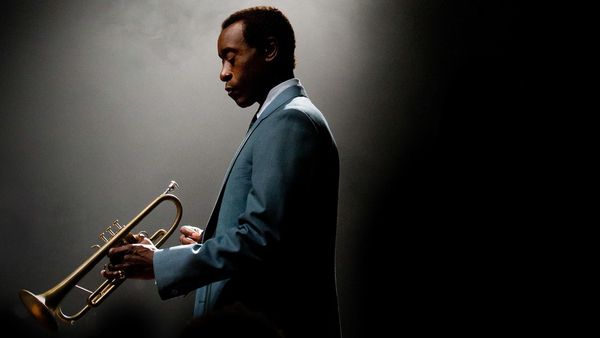Eye For Film >> Movies >> Miles Ahead (2015) Film Review
Miles Ahead
Reviewed by: Luke Shaw

Don Cheadle has gone on record to say that he hates the word “biopic” and that his directorial debut about peerless jazz legend Miles Davis is not a biopic either. This echoes Davis’ assertion that his music wasn’t jazz, because that’s a made up word, that it was more accurate to call it “social music” because that’s what he believed it really was. Cheadle is totally wrapped up in Miles because instead of skirting around this, he outright states it in a staged interview at the start of the film. But it’s fitting because this is no biopic, at most it is a loose interpretation of fragments of Miles’ life woven together in a loose fashion.
Scenes play off against each in non-linear fashion, sometimes jarring, at other times complimentary. Due to its non-conventional structure and editing, it would be easy to categorise this film as ja- hang on - social music, and be done with it, but it’s worth persevering with the unique flow. And speaking of flow, it would also be remiss not to speak up about the comprehensive understanding of the music that Cheadle displays, picking cuts from personal favourite of Davis, Sketches Of Spain, as well as riffing on the ubiquity of So What - “I like the one that goes ‘Dah-da’.” The film pulses with so many brilliant tracks from the back catalogue that even if it didn’t attempt to get into the details, it would be enjoyable for fans of the man.

This highlights what must be the primary concern for any film about a complex subject like Davis. There’s always the chance that it will compress the highs and lows, adopting a mode of eulogising or criticising without really trying to delve too deeply into what was really at work at the core of the subject. Cheadle’s husky, surly interpretation feels spot on at a surface level, but the idea that he hasn’t quite figured out how to transfer the flesh and blood of reality to the screen in a confident way always niggles. This primarily shows through his predatory and jittery directing, although even that has has its advantages: it allows the action to bounce from scene to scene with no regard for conventional structure, bounding across decades in a kind of free-association improv, whilst remaining considerate and educated in its movements, strengthening the jazz connotations.
The story is fairly simple, Rolling Stone Journalist David Braben (Ewan McGregor) blags his way into Miles’ inner circle by getting in a scrap with the five year recluse at his New York apartment and then scoring him some high quality coke as an apology. Miles has sworn off music, falling to drink and drugs to get over his shattered relationship and ailing health. Under the pretense of writing about his comeback, Braben accidentally sets off a catastrophic chain of events which see the two of them running around after the only copy of a session tape that is owed to Capitol Records. This city wide hunt results in Miles casting his mind back across his career and relationship with Frances Taylor (Emayatzy Corinealdi).
Though Cheadle and Corinealdi play the young couple off each other in a natural way, the terror of Davis' controlling nature as he attempts to cage his love falls a little flat. The film never fully commits to tarnishing the legacy of the man, happier to revel in his visionary nature and leaving his failings as a person to one side. This isn’t to say it doesn’t confront them at all, but it doesn’t really go hard enough on how ugly and violent he could be. The myth is clearly placed before the man here, and choosing not to address this by refuting the biopic status doesn’t quite convince. Miles isn’t whitewashed by any means, but reverence takes precedence, and it can be a little uncomfortable to transition from abuse to adulation.
However, that is perhaps the key to the film. In emulating Davis' own style, riffing off one idea to another with an abruptness that may seem like a mask for indulgent avant garde leanings, Cheadle attempts to give us the feel of the man rather than the real essence. This doesn’t excuse it in editing the context of some events, or remedy the fact that it fails on a number of levels, but it does make for a film that is more engaging and interesting than many of its pedestrian stable mates. The highs and lows are definitely there, and it refuses to put words into Davis mouth, instead crafting a sense of ambiguity. For my money, that lack of a hard line stance both defines and apologies a little too much to really capitalise on the opportunity this film has.
Reviewed on: 23 Feb 2016
















